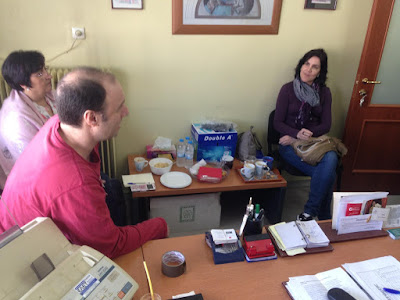As for the Orientation and Councelling, after talking about the treatment of diversity and disciplinary problems, the disruptive students and the integration of immigrants and students from socio-cultural disadvantaged contexts, we were confirmed what we had been told on the first day: the current situation of the country has reduced the national, regional and local educational budget so much that at the moment they have to share the councellor with other ten schools, so in practice it is teachers mainly who have assumed the role of the councellor. This is sad...
 |
| My colleagues Marga and Mª José during the meeting with parrt of the school's management team. |
Regarding the lessons we attended, I was so inspired by them as by the previous week's. First, we did a world café activity about racism. Despite being quite used to working with a similar version of this activity in my higher-level groups, I must say that the teacher in charge of the group (Mrs Dora Glaraki) provided it with a deeper meaning than I usually do in my lessons.
The activity consisted of the collaborative creation of four posters about racism. The students were displayed in four groups, with a host each. Each group had a few felt-pens and their tables covered with wrapping paper to serve as the poster. She gave each group a question to raise debate and they had to discuss it and write their conclusions on the poster for five minutes. The host was in charge of keeping the debate going on. At the end of the five minutes, each group changed to a different table to discuss a different topic, but for the host, who stayed at the table and worked with a new group. This way, all students talked about all the questions and all the hosts had a deeper idea of the question they had been dealing with. When all of them had talked about all the questions, the host presented the posters to the rest of the class:
 |
| A group of students preparing a poster. |
 |
| A host student presenting his poster. |
As I said before, I think that both the lesson's topic and the way of presenting the students' conclusions were deeper than I usually see in my lessons when I use this activity. And I saw clearly that they were proud of what they were presenting, even though the questions we posed at the end of each presentation were not that simple. So, this is one more thing I'll take into consideration the next time I prepare an activity like this for my students.
After the world café activity, we attended one more English lesson, this time with Mrs Lia Lefaki, devoted to refugees. In a previous meeting, she had told us about the books they have to use at school with the new educational reform and this lesson was an example of what they deal with these books:
 |
| Current students' book for year 2. MINISTRY OF EDUCATION, INVESTIGATION AND RELIGIOUS AFFAIRS. Institute for Educational Policy. English 2 General Secondary Education. |
During the lesson, Lia used videos, readings, role plays, a writing and so on to make her students use English as the vehicle to express their thoughts and opinions about the topics she raised for debate and discussion. These are the links to the videos she used in class:
Syrian refugees, by National Geographic.
Tilos, Europe's friendliest island?, by BBC News.
In essence, the videos were used by the teacher as a warm-up activity to present the students with the topic and the specific vocabulary. The readings were used to delve into the topic, for the students to analyse in further detail and reflect on them more deeply. The role plays were designed to let students practise what they had learnt about the issue and the writing was the way she used to evaluate their achievements.
Again, I was astonished at how English was just the excuse to make students have their say regarding complex topics with complex arguments.
No hay comentarios:
Publicar un comentario